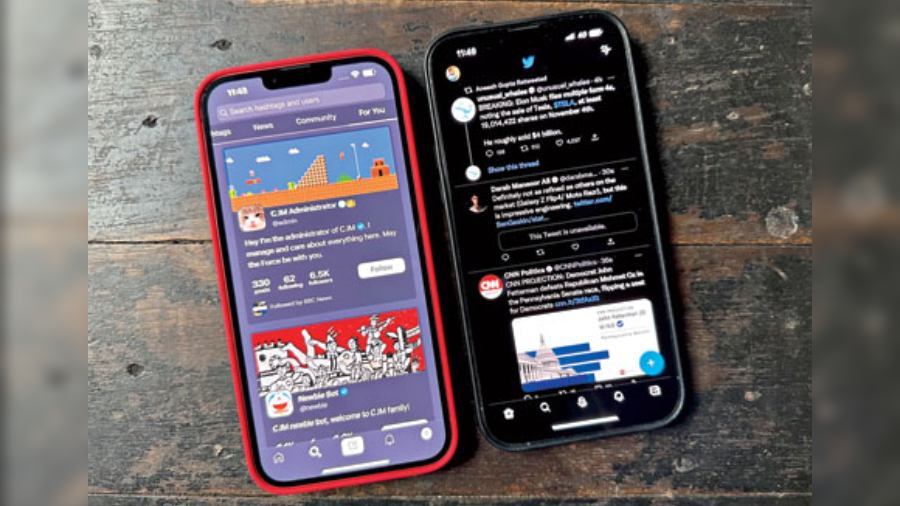At the moment Twitter is in a weird place as Elon Musk, the new owner of the platform, is trying to address issues like misinformation and hate speech on the platform. Then there is the issue about paying for certain features that will come with Twitter Blue. Each time a popular social media network tries to make a drastic change, a new crop of apps take over the conversation. We saw this happen a few months ago when Instagram tried to push video in a big way. In the case of Twitter, the alternative that’s being spoken about is Mastodon, which has an estimated 4.5 million accounts. That the fledgling platform is posing a challenge is clearly visible as earlier this week Musk tweeted three derogatory comments about Mastodon before deleting the posts.
Where does it come from?
Launched in 2016, Mastodon is the brainchild of software developer Eugen Rochko, who describes it as a “free, open-source decentralised social media platform” that wants to “a viable alternative to Twitter”. Mastodon is named after an extinct relative of mammoths and elephants. The software was developed by Mastodon gGmbH, a German nonprofit led by Rochko.
Mastodon is unlike Twitter. Its original source code is publicly available and can be redistributed and changed. Being open source, anyone can contribute to the code, making it easy to find and fix bugs, adding new features and translating its interface into different languages.
“Unlike the past five years that I’ve been running Mastodon operations as a sole proprietor, where Mastodon’s income was my personal income (minus all the expenses), I am now an employee with a fixed wage. My personal income will thus be lower but I was willing to go this route because I want Mastodon to have more resources for things like hiring extra developers, UX designers, developing official apps and so on, and I want there to be a clear boundary between fundraising for that cause and my personal income,” Rochko wrote in a blog post last year.
The structure of Mastodon is decentralised and works as a “federated network which operates in a similar way to email”. What does this mean? While signing up, you choose a server, like you do when choose to open an email account, say, on Gmail or Hotmail. For example, like TechCrunch points out, I can sign up with the climate change server, which will make my address read @[username]@ climatejustice.social. But I can communicate with users from other servers.

Eugen Rochko is the man behind Mastodon
It’s not Twitter
Twitter is an easy-to-use platform where you sign up and share content. Mastodon is a collection of social networks (or servers) linked together but are owned by different people or groups. Posts here are presented in chronological order and there are no advertisements because Mastodon is mostly crowdfunded. The servers that Mastodon oversees — Mastodon Social and Mastodon Online — are funded through Patreon, a membership and subscription service platform often used by content creators.
Instead of thinking of Mastodon in terms of Twitter, consider the experience more in terms of Discord, a talking and texting app where users connect servers with their own protocols and rules.
On Mastodon it’s more about work rather than hearing what celebrities or politicians have to say. You may find your favourite professor on climate change here but not Hollywood or Bollywood names.
There are drawbacks if you compare to Twitter. First, the user base is miniscule compared to Elon Musk’s company. Second, the interface may not appear friendly. Mastodon supports images, videos, audio and polls but doesn’t have something like Twitter Spaces or experimental ‘status’ tags.
The lingo
Users refer to individual communities as “instances” or servers that can be run by individuals, groups or organisations. Each server can have its set of rules, moderation policies and protocols in place. There are servers that anyone can join while others are invite-only or require approval by an admin. You can follow people regardless of the server they’re on.
Mastodon is described as part of the “Fediverse” or an interconnected web of various social media services. Using the Fediverse, your single Mastodon account also gives you access to other decentralised social networks.
At times, posts on Mastodon are called ‘toots’ but that is not as popular now as it was in the early days of the platform. It supports a number of Twitter-like features — replies, retweets (called ‘boosts’), favorites, bookmarks and hashtags. Direct messages on Mastodon are just @username posts, not private messages coming to a DM inbox.
While signing up, join a random group since you can always change your server affiliation later once you get the hang of things.
Can you leave Twitter?
Mastodon is getting a lot new users but it’s nothing compared to the 237 million daily active users on Twitter. Second, the decentralised system may appear frustrating for a new user. Important politicians, decision-makers, artistes and entrepreneurs continue to be on Twitter and it’s easy to find out what they are talking about. Not here. Having said that, Mastodon is a very well thought out service and has grown quickly enough to attract the love of users.
“It is a very positive thing to find that your work is finally being appreciated and respected and more widely known. I’ve been fighting for this for a long time, I started working on Mastodon in 2016, back then I had no ambitions of it going far at all. It was very much a hobbyist project at the start, then when I launched publicly it seemed to strike a chord with at least the tech community and that’s when I got the original Patreon supporters that allowed me to take on this job full time,” Eugen Rochko, founder of Mastodon, recently told Time magazine.
